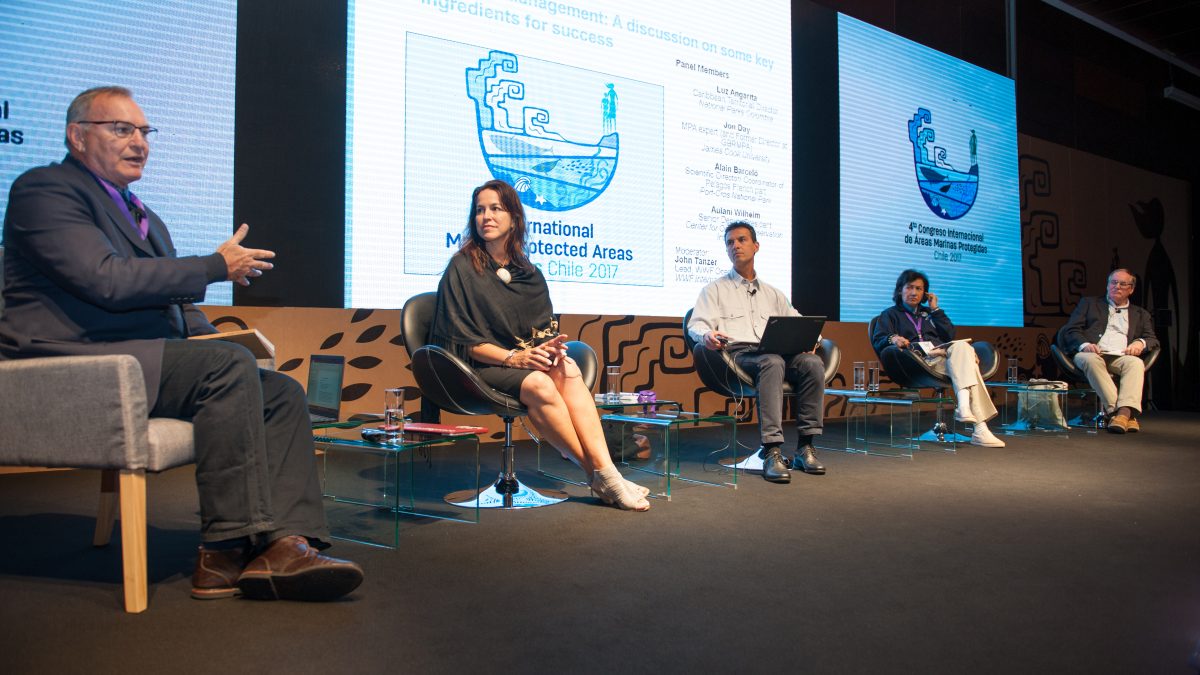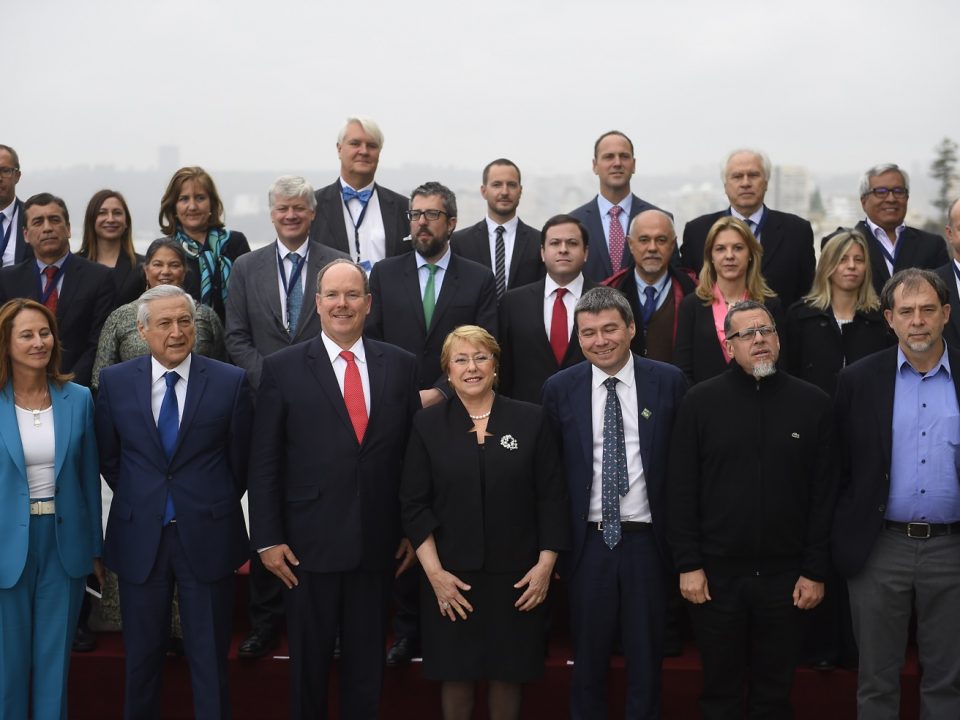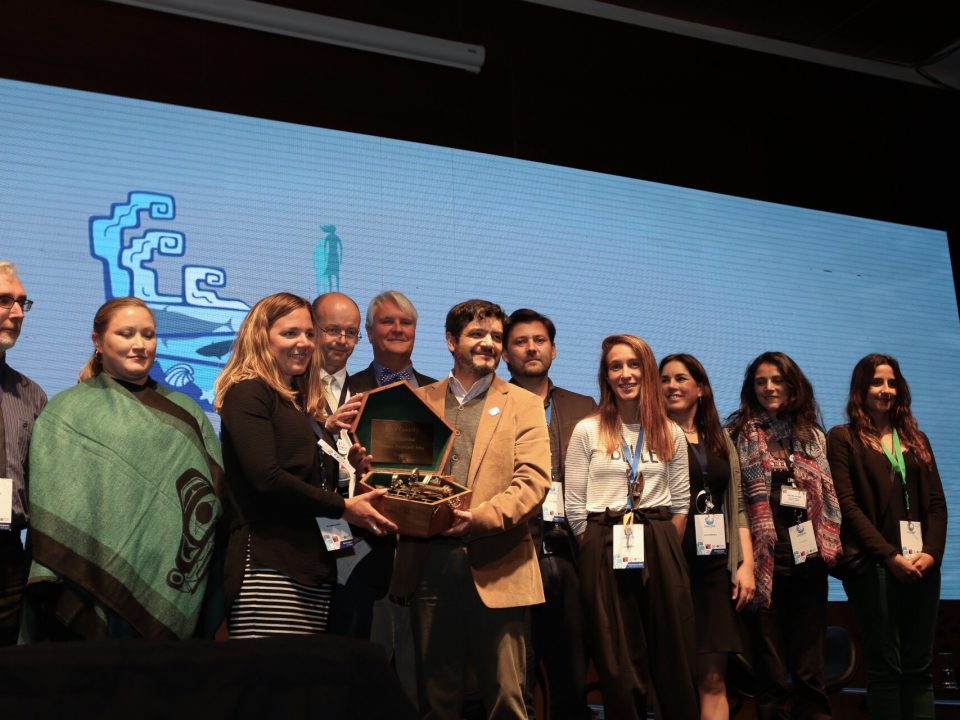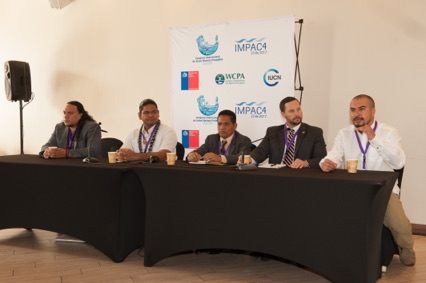To achieve real Marine Protected Areas, and not just paper parks, is what moves the more than 1,000 participants of the International Marine Protected Areas Congress, IMPAC 4, who have continuously highlighted this purpose through their speech. A key aspect to achieve this is having effective and successful management strategies, and that is why today’s panel was focused on this issue.
John Tanzer from WWF and panel moderator, pointed out that at IMPAC1, held 12 years ago, it was discussed that IMPACs should really be a meeting for managers. “Politics and scientist were welcomed, but the subject should have been only for MPA managers. With today’s session in a way, we come back to the original purpose of this congress.” He also mentioned that there are key issues determining management effectiveness like: sustainable financing, compliance and enforcement, community engagement, as well as education and public awareness, among others. “Monitoring and evaluation is another critical aspect. It tends to be the poor cousin compared to research and one of the first things that is dropped off.” He stressed that it is fundamental to assess the value of the management and protection of MPAs, and what they contribute back to the community to make the case for investing in effective management.
Aulani Wilhelm from Conservation International, reminded the public that in terms of Large Scale MPAs and MMAs (Marine Managed Areas) there are 30 sites established and declared in 14 countries, which cover 21.3 million km2 of ocean, approx. 6% of total ocean surface. “Large scale MPAs contribute a lot to global targets, but management is key. It’s not enough to declare MPAs if we don’t manage them effectively. We don’t want to have Paper Parks.” There are a number of challenges in terms of compliance and enforcement for large scale MPAs when you are far away from them. It is difficult, but there is a change in the shift in the last couple of years. It went from being a problem to an opportunity to work together with other countries, and were the conversation on conservation takes the same importance as the protection of fisheries or other strategic issues. Management isn’t about managing nature, it’s about people. As managers we need to make that critical link, engaging people to respect and protect the area, as well as engaging industry to co-manage with a broader view”, she said.
Alain Barceló from France’s National Park Port Cros, mentioned that Port Cros National Park was created in 1963 and was the first Marine Park in European Union and which recently amplified its borders in 2012. “To succeed in management of MPAs we need a range of conditions: a strong structure of establishment, substantial financial resources from the French Environmental Ministry, numerous administrative and technical incentives for staff, and equipped rangers for raising awareness and advancing policy. Without our rangers, we would be a paper park”, he emphasized.
Luz Angarita from Colombia National Parks, mentioned that the last two MPAs declared in Colombia were possible to achieve due to a bottom up approach. Bahía Portete National Park was accomplished in a joint work with 6 indigenous communities, while the Iprayona Fauna Sanctuary was the result of working together with 3 community councils of Afro-descendant communities. .
“These joint declaratory and subsequent management processes have taken us several years and brought us closer to the communities. The limits, values and conservation objects as well as uses are defined in conjunction with communities.”
She also pointed out that Colombian legislation allows this type of work to done jointly with the communities, and that Colombia National Parks also have a total commitment to the communities. “We understand that they have an ancestral vision and have been in those territories for centuries. For us, it is important to build a shared vision in this protected area, based on mutual respect and understanding”.
Jon Day, ARC Ctr. of Excellence for Coral Reef Studies, Australia, referred to the case of the Great Barrier Reef Marine Park with 344.400 km2. “We have about 1 million people living on this coast and 1.5 million tourists visiting every year, which brings 6 billion dollars per year in economic value through the tourism industry.”
Day emphasized that having a legal framework is very important, as well as a management approach involving state and federal authorities working together in different layers. In terms of monitoring –he added- it is important to know how to achieve your objectives in terms of results. Monitoring isn’t just collecting data, you have to analyze it and understand what information that data is giving you. “Also community engagement is fundamental. We’ve also put a lot of efforts in educating people about the protection of the area. Education is a much more effective process that enforcement of the law.”
Chilean experience of effective management with the community
In the Chile Pavilion of the exhibition, the various actors involved in the “Pitipalena-Añihué” Protected Coastal Marine Area (PCMA-MU), created in 2014 in the town of Raúl Marín Balmaceda, in the Aysen Region, presented a pioneering work, where for the first time in Chile the local organizations were involved in the design of the management plan of a protected area.
To this end, the almost 200 inhabitants of the area created a foundation dedicated to this task and its future joint administration with the State, a process which was done together with the regional secretariat of the Environment of the Aysen Region and the organization WWF-Chile, and that today already has a preliminary proposal of zoning for the PCMA-MU as well as four strategies of protection.
Its objective is not only to guarantee and be responsible for the protection of its ecosystems, but also to obtain the environmental, economic and social benefits that this work will bring in the long term, for them and their children.
In this regard, Aysen’s regional secretariat of the Environment, Susana Figueroa, stressed that “countries and governments need citizens committed to their environment, responsible men and women with their land. The construction of management plans, which are the rules protected areas are managed with, is a developing subject that should not be seen as an impediment but as an opportunity to have a regulation that is much more coherent with each community’s reality”.
IMPAC 4 closures comes tomorrow Friday September 8th in La Serena – Coquimbo with the panel on “Shared Future”, which will address the challenges and opportunities of marine protected areas. Panel members will be Mike Wong (IUCN North America) as moderator, Dan Laffoley (IUCN-WCPA), Tukabu Teroroko (Phoenix), Mariasole Bianco (IUCN-WCPA Young Professionals), Sandra Bessudo (Malpelo Foundation, Colombia). Also the “Kenton Miller” award will be announced tomorrow.
The closing ceremony is scheduled for 15.45 hrs in the Plenary Salon of Enjoy Hotel in Coquimbo, where the sextant will be delivered to the organizers of IMPAC 5.
On Saturday September 9th,, Viña del Mar city will host a High-Level Meeting, where a “Call to Action for the Oceans” will be signed, as a result of this IMPAC 4.




